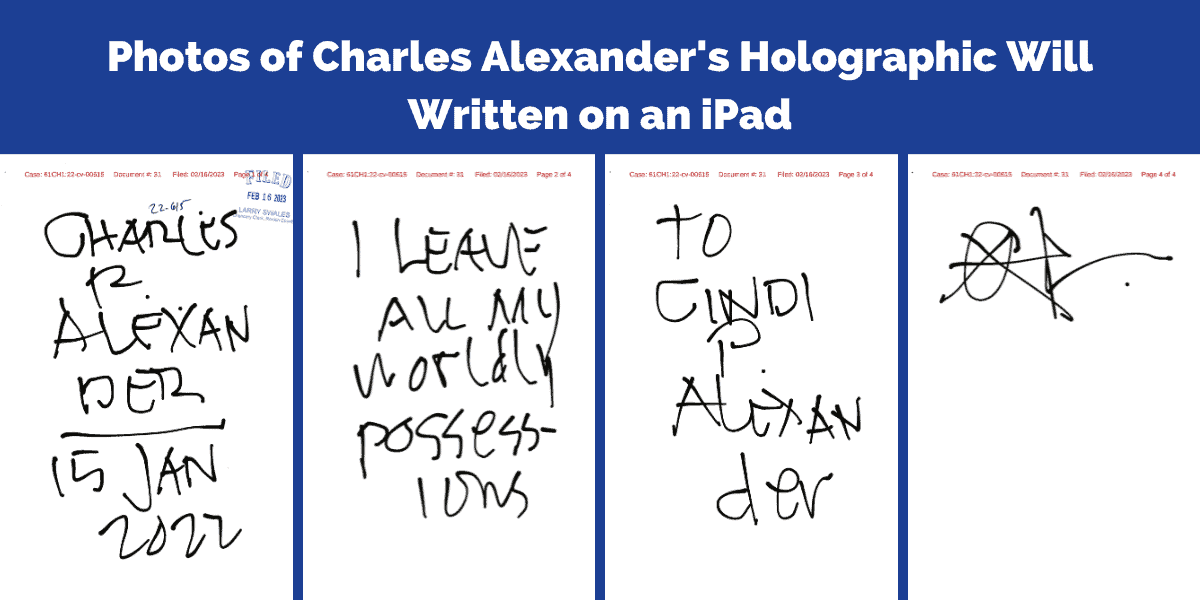The Complexity of Dealing with a Holographic eWill
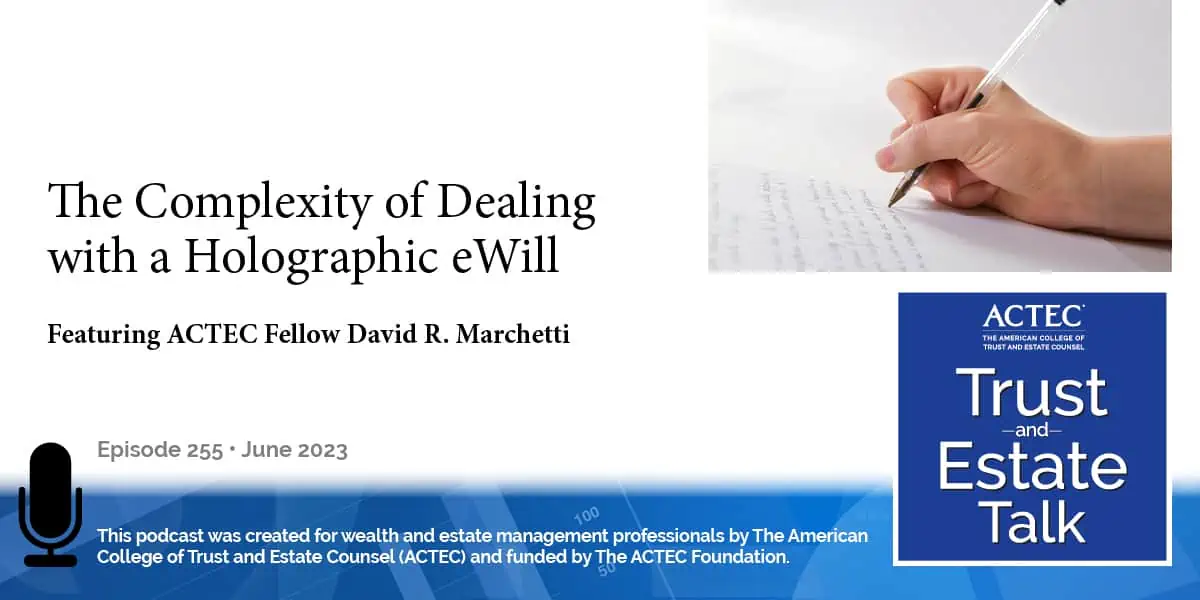
“The Complexity of Dealing with a Holographic eWill,” that’s the subject of today’s ACTEC Trust and Estate Talk.
Transcript/Show Notes
This is Travis Hayes, ACTEC Fellow from Naples, Florida. A holographic will is simply a will that is in the testator’s own handwriting. Not every state accepts holographic wills. ACTEC Fellow David Marchetti of Richmond, Mississippi joins us today to discuss the holographic will of Charles Alexander, which was written on an iPad using a stylus. Welcome, David.
David Marchetti: Thank you, Travis. It’s good to be here. This was a very interesting case, in some respects. The widow came to my office. Her husband, Charlie, had died of COVID after several weeks in the hospital and he had no will before he entered the hospital. He had his wife and three children from a prior marriage who were his heirs-at-law under the intestacy laws of Mississippi. So, when she came in, I thought we were dealing with an intestate estate. The main asset in the estate was their home in Rankin County, Mississippi, and the home had a HELOC on it. And she was trying to get the HELOC refinanced, but that was going to be difficult because she only owned a fourth interest in the house plus a homestead right.
And so, we were looking at some various things that maybe she could do; try to find a way to pay the loan off or things like that that. The children were not being very cooperative and so she was kind of in a pickle. But she mentioned to me in, I think it was, the first meeting that we had that her husband had written something on an iPad, but that she had been told by another attorney that this was not a valid will. And so, I said, “Well, let me take a look at it just in case and I’ll see if I agree with that attorney.” And so, I expected to see a typewritten instrument. But when she handed it to me, turned the iPad on, I found that it had been written entirely in the testator’s handwriting and signed at the bottom, which is all that’s required under Mississippi law to have a valid holographic will, plus, of course, testamentary capacity.
And so, I immediately thought, “Well, this is a holograph.” The only difference was that it wasn’t on paper with ink. It was rather written in an electronic medium. But it seemed to comply with our statute. The will, it had been written with a stylus, and it said, “I give all my worldly possessions to Cindy Alexander,” that was his wife. And I thought “Well, this is great because if we can probate this, then the title to the residence will be in her and she can proceed to refinance the house.”
So, I drew up a petition to probate that. We first had to find two disinterested witnesses not to the execution of the document, but to the handwriting and the signature of the decedent of the testator and also, that affidavit has to say something about mental capacity as well. So, we were able to find two disinterested witnesses to that and got those affidavits. And then we filed for probate and decided to probate it in solemn form, meaning that we asked the court to probate it after a hearing with notice to interested parties who were the children. So, we set it for a hearing, and one of the children showed up claiming to represent his siblings and said that they objected to the will on the basis that they thought that their father, who had signed it in the hospital, may have lacked testamentary capacity.
They did not object to the holographic nature of the will or the fact that it had been written on an iPad. The judge did something a little unusual in my experience and that is that he went ahead and admitted the will to probate in common form even though there was an objection to it. And he told the child that showed up that he should make it his hobby to find an attorney to come and contest it if he wanted to, and that he had two years under the statute to contest the will. So, the will was admitted to the probate.
The next question was, “Well how do I get this admitted in the clerk’s office? What do I file in the probate clerk’s office?” And so, I had the iPad with me and I showed it to the judge, and he suggested I just print the will off and give that to the clerk. And he was not bothered in the least about issues like chain of custody of the iPad or anything of that nature, any evidentiary concerns he did not raise and I did not want to call his attention to it either. So, we simply printed it off, filed the affidavits, filed the printed copy and then we proceeded with the administration of the estate. So, we ran the notice to creditors and the bank filed a claim on the estate, and we had to get them to release that to close the estate. And they were willing to do that because they had agreed to refinance the house if we could get it in her name.
So, the bank released their claim and we proceeded to close the estate. So, again, I noticed the children to a hearing to close the estate. I had never heard from a lawyer for any of them. So, on the day of the hearing they did not show up. So, it was a pretty simple matter then just to close the estate out. And then, after the estate was closed, they had to have a real estate closing. And so, the closing attorney left a message for me to call him back and so, everything started racing through my mind. “What does he want? What does he want? What’s wrong? What’s wrong?” And I thought about the term “all my worldly possessions,” and I thought “is he gonna tell me that doesn’t include real estate?”
And so, my heart kind of fell into my stomach for a little bit there. And I did some research on that question and it turns out that “all of my worldly goods” generally does include real estate, unless the will indicates in other language that it does not. So, I felt good about that, and in fact the real estate attorney didn’t question that. So, the closing occurred in due course and the client was obviously very happy. And it made me feel good about practicing law because it just showed that we really can help people in very practical ways and we should be proud of what we do. So that’s the story.
Travis: Thank you, David, for discussing the interesting case of Charles Alexander’s holographic electronic will. If anyone is interested in seeing pictures of the holographic e-will discussed by David, those pictures will be posted on actecfoundation.org.
You may also be interested in:
If you have ideas for a future ACTEC Trust & Estate Talk topic, please contact us at ACTECpodcast@ACTEC.org.
© 2018 – 2024 The American College of Trust and Estate Counsel. All rights reserved.
Latest ACTEC Trust and Estate Talk Podcasts
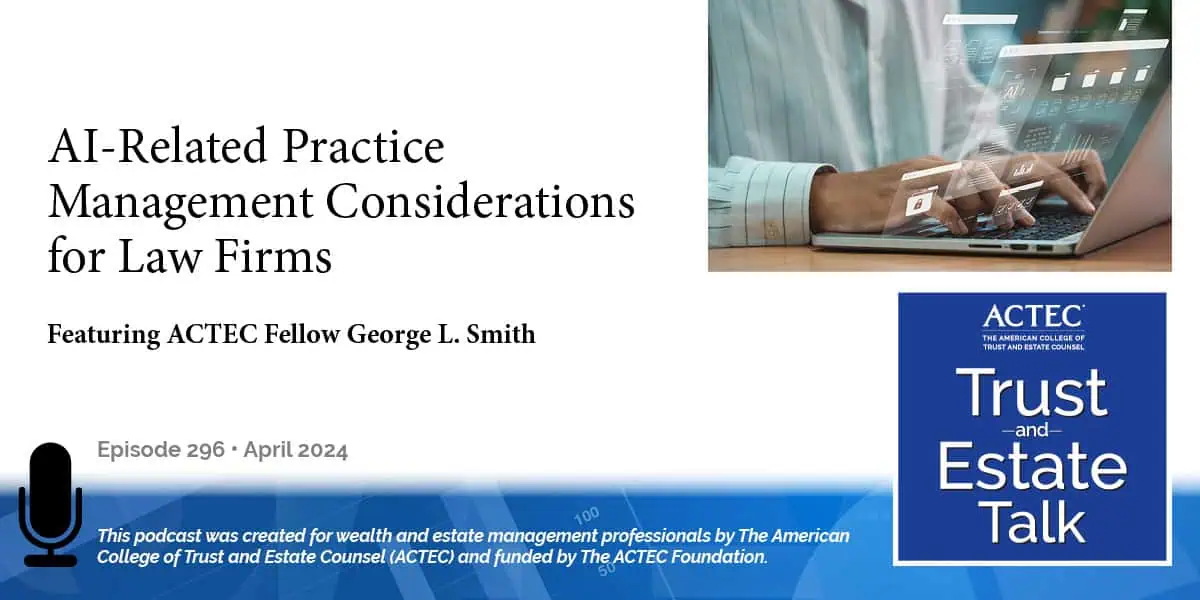
AI-Related Practice Management Considerations for Law Firms
A discussion for law firms about how to incorporate AI in their practice management, including staff considerations, the “billable hour,” and more.
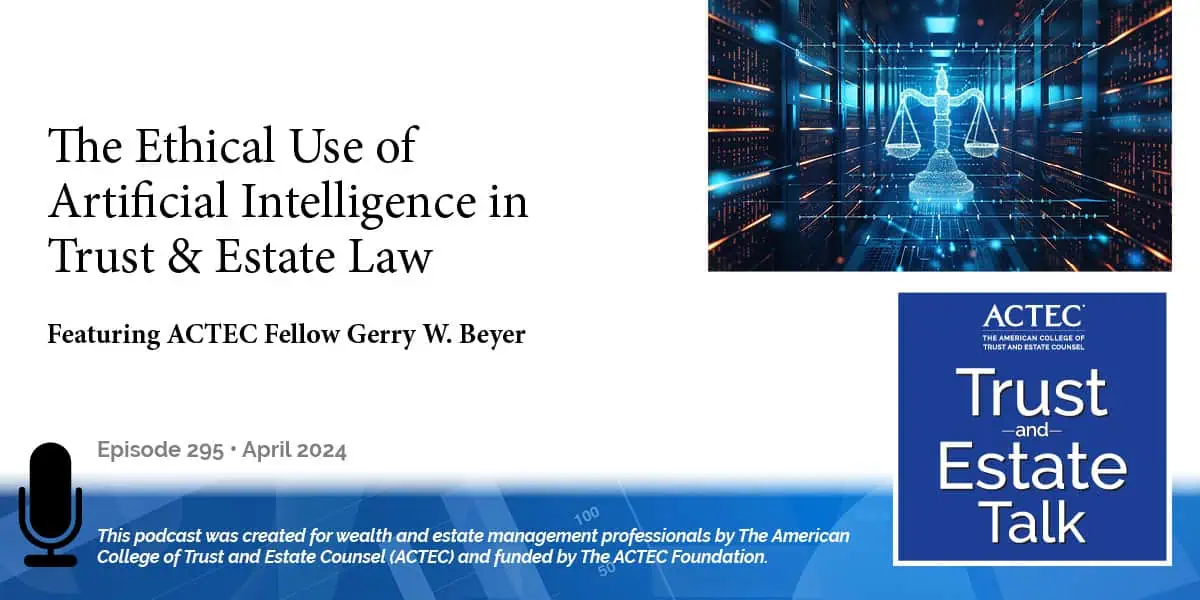
The Ethical Use of Artificial Intelligence in Trust & Estate Law
A law professor offers insights into the risks, rewards, duties and ethical considerations of lawyers using AI in their T&E practices.
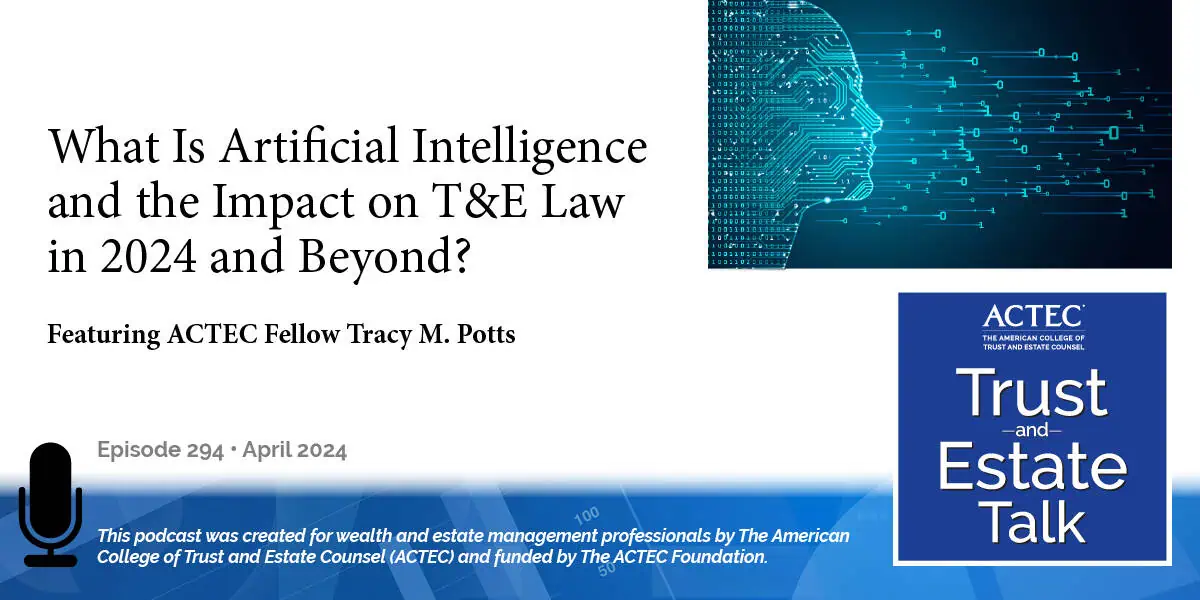
What Is Artificial Intelligence and the Impact on T&E Law in 2024 and Beyond?
A primer on the types and uses of AI, then a deeper dive into the impact on trust and estate law from types to applications to ethical considerations.

